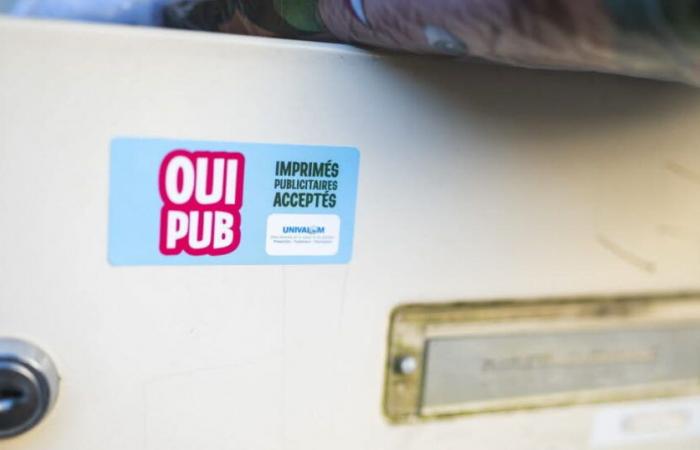First assessment after more than two years of testing. The government unveiled last week an evaluation report expected since October 2024. It provides the first assessment of the ”Oui Pub” experiment – carried out by Ademe – launched in May 2022 and scheduled until April. This system, implemented in 14 voluntary pilot territories, aims to prohibit the distribution of unaddressed advertising materials (IPSA), except for residents who have affixed a ”Oui Pub” sticker to their mailbox. Among the communities concerned are Grenoble-Alpes-Métropole, Bordeaux, the Métropole du Grand Nancy, Troyes Champagne Métropole and the agglomeration of Agen. This experiment comes from the Climate and Resilience law of 2021, aiming in particular to limit waste.
A device little adopted but well received
Ultimately, few residents played the game. In the pilot areas, the rate of affixing the “Oui Pub” sticker ranges between 0.33% in Bordeaux and 18.42% in Dunkirk. 10% of residents who had not affixed the sticker did not know where to obtain it. However, the initiative benefits from a generally favorable perception. According to data from the evaluation report, 44% of residents in the experimental territories say they are “rather satisfied”, while 30% are undecided. Only 9% express dissatisfaction with the system, and a small minority (1%) is opposed to the generalization of “Yes Pub” on a national scale.
Reduction of paper waste
The government report then highlights a real change in paper waste. The data collected from the pilot territories show a significant reduction in the tonnages of paper collected via selective sorting and residual household waste. Between 2019 and 2023, the 14 territories recorded an average drop of 48% in tonnages of paper collected, with variations ranging from 20% to 70% depending on the area. A decrease that exceeds the national trend.
The report emphasizes, however, that it is not possible to determine precisely to what extent this drop is directly attributable to the “Oui Pub” experiment. “The pilot territories indicate a reduction in tonnages collected, significantly marked in 2020 due to the health crisis. A slight increase occurs in 2021 and gives way to the downward trend from 2022, the year the experiment starts,” we read in the report. The government report also concludes that it is complicated to determine that less use of paper and increased use of digital technology would be less polluting, while calling for “advertising sobriety”.
Decline in activity in the printing industry
The experiment is also not without consequences for the paper sector. The reduction in unaddressed advertising printing has had a significant impact on printers and distributors who depend on these media. According to the UNIIC (National Union of Printing and Communication Industries), the printing industry as a whole is in decline, marked by a drop in activity, closures of industrial sites or even waves of layoffs. Thus, Mediaposte, one of the majority national distributors with Milee – which was placed in compulsory liquidation – had to face the reduction of its activities. According to the union, the “Oui Pub” experiment would accentuate this trend
At the level of the communities concerned, 90% of them have a “very favorable” or “favorable” perception of the experiment and 89% are in favor of perpetuating the system. However, it is the destruction of jobs and the replacement of printed advertisements with digital advertisements which are identified as the main negative impacts of the experiment.
Belgium






